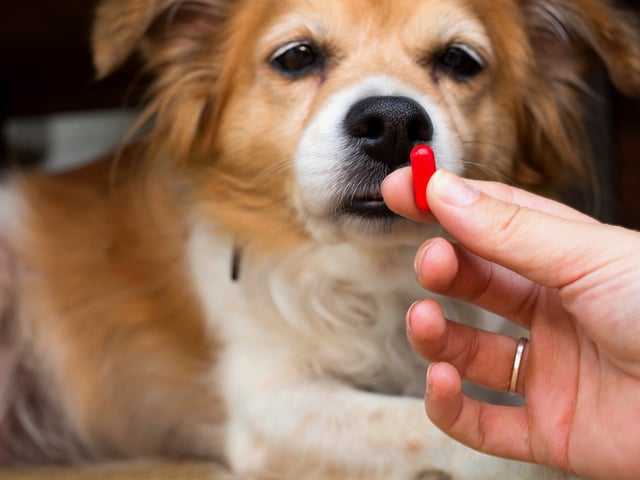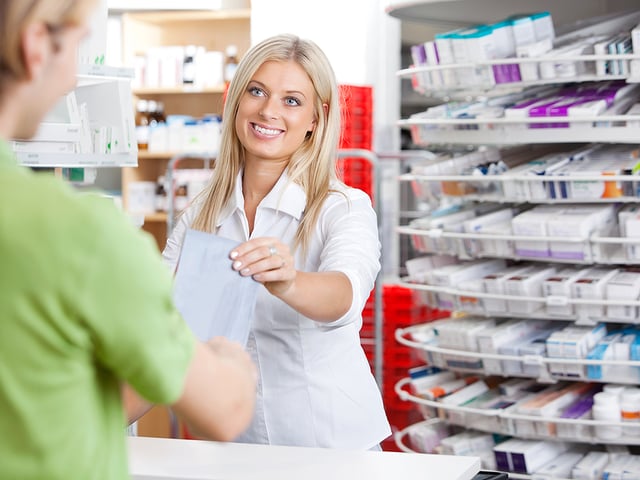
Human Medication That Is Safe for Dogs
Did you know that many medications, including common over-the-counter medications, are also safe for use in pets? It is true, although you should always consult your local veterinarian before administering any medications to your pet. This is especially true since most medication doses are weight-based, just like those for humans. Since I’m a dog lover, this article will explore the most widely used over-the-counter medications to treat common ailments your pup may have—because whose dog doesn’t like to get into trouble once in a while, right?
Allergies or Pruritus (Itch)
Does your pup get the sniffles or sneezes during allergy season or seem to constantly rub his/her face on the ground or couch? Antihistamines are effective medications in treating seasonal allergies or pruritus (itching).
-
Diphenhydramine, also known as Benadryl®, is a first generation antihistamine. Diphenhydramine is typically used for itching or for allergic reaction symptoms rather than for seasonal allergies.
-
Loratadine (Claratin®) and cetirizine (Zyrtec®) are the most common second generation antihistamines.
Although all antihistamines can cause drowsiness and even hyperactivity in some dogs, the second generation antihistamines have a lesser risk. Remember, these medications come in a variety of combination products which should not be used for your dog. Make sure the product you choose is an antihistamine only and one that is approved by your veterinarian.
Wounds and First Aid
Dogs like to have fun and explore the outdoors. Sometimes they may come back from exploring with a cut or wound. Hydrogen peroxide is a safe antiseptic to use to clean and disinfect superficial cuts and wounds. After disinfecting the cut or wound, it is safe to apply a triple antibiotic ointment, like Neosporin®, to the affected area. Be sure to cover it with a wrap or bandage so your pup is not able to lick it off. It is also important to let cuts dry out over time so they scab over and eventually heal.
Dry Eyes or Nose
Does your pup blink at you frequently? Or, does your pup have a dry nose and sound congested? This can be common during cold winter months or during times of dry heat and drought. Lubricating eye drops, like Artificial Tears®, are great to use for keeping your dog’s eyes moist. They are also beneficial for flushing out any debris that may get into your dog’s eyes. For dry nose or nasal congestion, nasal saline spray will do the trick. The trickier part will be to keep your pup’s nose still during application.
Diarrhea
Once in a while, your pup might eat something nasty outside, which will result in diarrhea. Clinically speaking, diarrhea is a defense mechanism used to expel something foreign (meaning something the body does not agree with) from the body as soon as possible. When diarrhea strikes, you do not necessarily want to stop it using anti-diarrheal medications. Doing so will bottle up the foreign matter (typically a bacteria) in the body and make matters worse. With that being said, you may consider using an antidiarrheal medication, like loperamide (Imodium®), for a one time dose prior to transportation just so your pup does not have an accident in your vehicle.
Bonus: Saving on Your Pet’s Prescription Medications
Many prescription medications that are safe for use in humans are also safe for pets as well.
-
Many people have the misconception that all animal medications must be supplied by a veterinarian’s office or specific pet pharmacy. Some medications are specific to animals only, in which case they can only be supplied by your veterinarian’s office or a pet pharmacy. All other medications should be available at any local pharmacy, provided you have a valid prescription written by your veterinarian.
-
Most people do not have medication or health insurance for their pet, leaving them to think that any prescription medication for a furry friend will end up costing an arm and a leg. To help reduce the financial burden of pet prescriptions, be sure to ask your local pharmacy if they have a free savings card or program. Most, if not all, local pharmacies do have one of these, which will reduce the prescription cost to some degree. All you have to do is ask!
-
Be sure to go online and look for manufacturer’s savings cards, which are typically available for brand-only medications. Also, be sure to visit the GoodRx® website, which provides coupons for almost all medications and shows which pharmacies accept their coupons.
Disclaimer: this article is for informational purposes only. Do not administer any medication to your pet without consulting your veterinarian first. UnionMedia LLC and its contractors cannot be held liable for how you use or interpret the information provided above.
Keep Reading

PTCB Pharmacy Technician Certification Exam Blog
Memorable Mnemonics: Master Drug Knowledge for the PTCB Exam
Studying for the Pharmacy Technician Certification Board (PTCB) exam is…

PTCB Pharmacy Technician Certification Exam Blog
The Top 200 Drugs on the PTCB
The Pharmacy Technician Certification Board (PTCB) exam is the final st…

PTCB Pharmacy Technician Certification Exam Blog
Is the PTCB Exam Hard?
Is the PTCB Exam Hard? Did you know that in 2021, over 430,000 pharmac…